The divine right of kings - Study guides, Class notes & Summaries
Looking for the best study guides, study notes and summaries about The divine right of kings? On this page you'll find 454 study documents about The divine right of kings.
Page 3 out of 454 results
Sort by
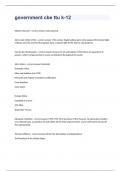
-
government cbe ttu k-12 questions and answers graded A+
- Exam (elaborations) • 8 pages • 2024
- Available in package deal
-
- $12.99
- + learn more
government cbe ttu k-12William Hancock - correct answer Union general John Locke () - correct answer 17th century English philosopher who opposed the Divine Right of Kings and who asserted that people have a natural right to life, liberty, and property. Charles de Montesquieu - correct answer famous for his articulation of the theory of separation of powers, which is implemented in many constitutions throughout the world. John Adams - correct answer Federalist Domestic Policy: Alien a...
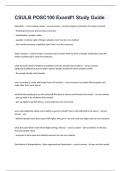
-
CSULB POSC100 Exam#1 Study Guide 2024/2025 passed
- Exam (elaborations) • 10 pages • 2024
-
Available in package deal
-
- $17.99
- + learn more
CSULB POSC100 Exam#1 Study GuideLiberalism - 5 core Lockean Values - correct answer - private property: protection of money and land - limited government: prevent abuse of power - individualism: people matter - equality: no divine right of Kings (nobody is born to rule over another) - free-market economy: capitalism (gov't don’t run the economy) state of nature - correct answer a concept used to show what the lives of people would have been like before societies/gov't came into exist...
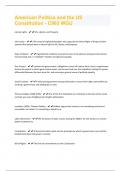
-
American Politics and the US Constitution - C963 WGU Questions and Answers(A+ Solution guide)
- Exam (elaborations) • 66 pages • 2023
- Available in package deal
-
- $16.99
- + learn more
natrual rights - Life, Liberty, and Property John Locke - 17th century English philosopher who opposed the Divine Right of Kings and who asserted that people have a natural right to life, liberty, and property. State of Nature - Hypothetical condition assumed to exist in the absence of government where human beings live in "complete" freedom and general equality. Due Process - involves the government's obligation to treat all citizens fairly. Such a requirement lessens the extent to whi...
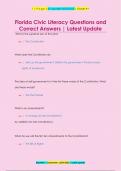
-
Florida Civics Literacy Questions and Correct Answers | Latest Update
- Exam (elaborations) • 19 pages • 2024
- Available in package deal
-
- $13.79
- + learn more
Which of the following ancient civilizations established a republican form of government? A. Roman B. Egyptian C. Greek D. Persian → ::- A During the 6th century B.C.E., the ancient Athenians divided the powers of their government between two assemblies and guaranteed certain political rights to all male citizens. How do these political reforms best illustrate how societies develop? A. by limiting government authority B. by choosing government leaders C. by improving gover...
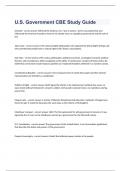
-
U.S. Government CBE Study Guide questions and answers graded A+
- Exam (elaborations) • 11 pages • 2024
- Available in package deal
-
- $15.49
- + learn more
U.S. Government CBE Study GuideAristotle - correct answer Affirmed the existence of a "law of nature," but he was admired by and influenced the American Founders more for his related views on republican government and the rule of law. John Locke - correct answer 17th century English philosopher who opposed the Divine Right of Kings and who asserted that people have a natural right to life, liberty, and property. Karl Marx - correct answer 19th century philosopher, political economist, so...
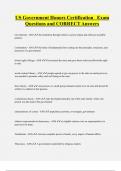
-
US Government Honors Certification Exam Questions and CORRECT Answers
- Exam (elaborations) • 10 pages • 2024
- Available in package deal
-
- $8.49
- + learn more
Government - ANS the institution through which a society makes and enforces its public policies Constitution - ANS the body of fundamental laws setting out the principles, structures, and processes of a government divine right of kings - ANS God created the state and gave those with royal blood the right to rule social contract theory - ANS people agreed to give up power to the state as much power as was needed to promote safety and well being in the stat
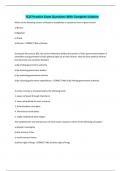
-
FCLE Practice Exam Questions With Complete Solution
- Exam (elaborations) • 14 pages • 2024
- Available in package deal
-
- $17.49
- + learn more
FCLE Practice Exam Questions With Complete Solution Which of the following ancient civilizations established a republican form of government? a) Roman b) Egyptian c) Greek d) Persian - CORRECT ANS-a) Roman During the 6th century BCE, the ancient Athenians divided the powers of their government between 2 assemblies and guaranteed certain political rights to all male citizens. How do these political reforms best illustrate how societies develop? a) by limiting government authority b) b...
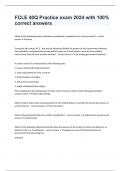
-
FCLE 40Q Practice exam 2024 with 100% correct answers
- Exam (elaborations) • 7 pages • 2024
-
- $17.49
- + learn more
Which of the following ancient civilizations established a republican form of government? - correct answer Roman During the 6th century B.C.E., the ancient Athenians divided the powers of their government between two assemblies and guaranteed certain political rights to all male citizens. How do these political reforms best illustrate how societies develop? - correct answer by limiting government authority A certain country is characterized by the following traits: 1. power achieved throu...
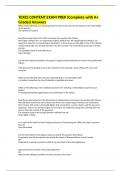
-
TEXES CONTENT EXAM PREP|Complete with A+ Graded Answers
- Exam (elaborations) • 12 pages • 2024
-
- $9.89
- + learn more
TEXES CONTENT EXAM PREP|Complete with A+ Graded Answers Which of the following is an advantage that the Texan army had over the Mexican army at the Battle of San Jacinto? The element of surprise Read the excerpt below from 1969 and answer the question that follows. We fought a military war; our opponents fought a political one. We sought physical attrition; our opponents aimed for our psychological exhaustion. In the process we lost sight of one of the cardinal maxims of guerrilla war: t...
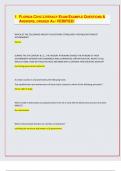
-
1 FLORIDA CIVIC LITERACY EXAM EXAMPLE QUESTIONS & ANSWERS, G| LATEST UPDATES/ COMPLETE EXAM PREDICTION PAPER |RADED A+/ VERIFIED/
- Exam (elaborations) • 9 pages • 2024
-
Available in package deal
-
- $7.99
- + learn more
1 FLORIDA CIVIC LITERACY EXAM EXAMPLE QUESTIONS & ANSWERS, GRADED A+/ VERIFIED/ WHICH OF THE FOLLOWING ANCIENT CIVILIZATIONS ESTABLISHED A REPUBLICAN FORM OF GOVERNMENT? Roman DURING THE 6TH CENTURY B.C.E., THE ANCIENT ATHENIANS DIVIDED THE POWERS OF THEIR GOVERNMENT BETWEEN TWO ASSEMBLIES AND GUARANTEED CERTAIN POLITICAL RIGHTS TO ALL MALE CITIZENS. HOW DO THESE POLITICAL REFORMS BEST ILLUSTRATE HOW SOCIETIES DEVELOP? by limiting government authority A certain country is characteriz...

That summary you just bought made someone very happy. Also get paid weekly? Sell your study resources on Stuvia! Discover all about earning on Stuvia


